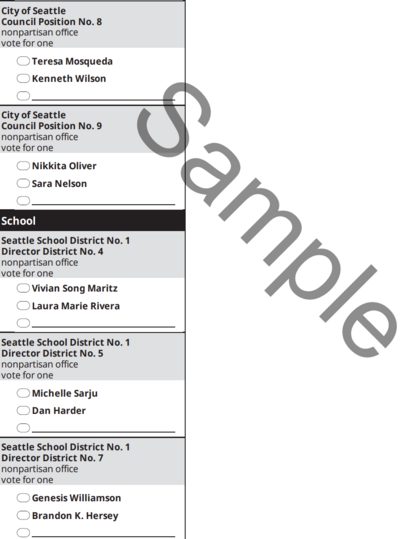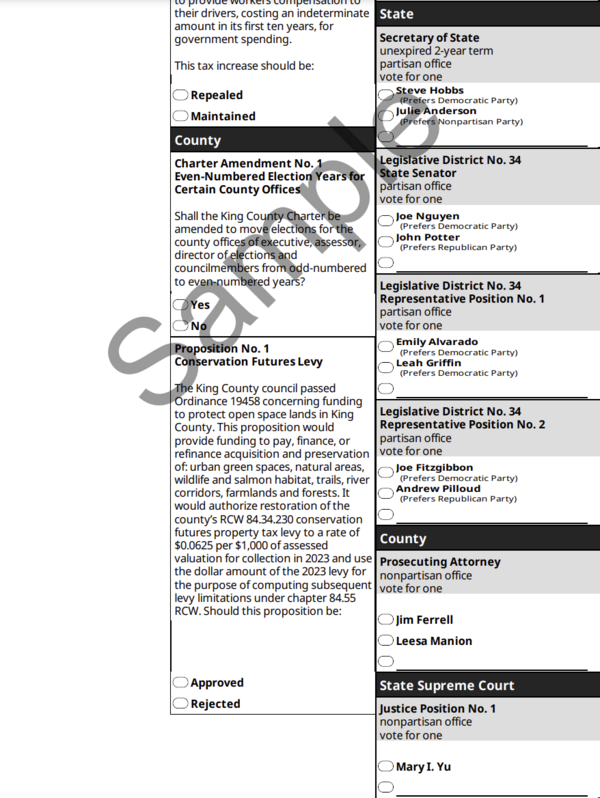Become part of the movement for unbiased, accessible election information. Donate today.
Party labels in Washington school board elections

|
| Washington overview: • Election dates: Off cycle |
| Key policies: • Election dates and timing • Party labels on the ballot |
| Key terms • On-cycle elections • Off-cycle elections • Off-year elections • Off-date elections • Party labels • Partisan elections • Nonpartisan elections |
School board elections in Washington are nonpartisan, which means party labels do not appear on the ballot for school board candidates.
![]() See law: Washington Statute RCW 29A.52.210 and RCW 28A.343.330
See law: Washington Statute RCW 29A.52.210 and RCW 28A.343.330
There were 297 public school districts in Washington with a total of 1,497 school board member seats as of 2022. Those school districts operated a total of 2,466 schools serving 1,136,455 students.
Washington is one of 41 states with state laws providing for nonpartisan school board elections.
The information in this page was last updated in 2022. Please email editor@ballotpedia.org with any updates, corrections, exceptions, or improvements.
Washington state law governing party labels on the ballot for school board elections
School board elections in Washington are nonpartisan, which means party labels do not appear on the ballot for school board candidates. Washington statute specifies partisan and nonpartisan offices. Washington has a top-two primary system, which means all candidates appear on the same primary ballot regardless of party affiliation. The top-two candidates advance to the general. For partisan races, candidates can but do not have to express a preference for a political party. If they do, the ballot specifies their party preference. For nonpartisan races, candidates cannot express a party preference. RCW 28A.343.330 states that, "the positions of school directors and the candidates therefor shall appear separately on the nonpartisan ballot."
![]() See law: Washington Statute RCW 29A.52.210 and RCW 28A.343.330
See law: Washington Statute RCW 29A.52.210 and RCW 28A.343.330
Examples of how school board candidates appear on the ballot in Washington
Below are excerpts from an odd-year election sample ballot in Washington with only nonpartisan races and an even-year election sample ballot containing both partisan and nonpartisan races:
How does Washington compare to other states?
Across the country, there are 13,187 public school districts governed by a total of 83,183 school board members. They are elected directly by voters except for a small handful of exceptions who are appointed.
As of July 2025, over 85% of school boards are elected without any party labels on the ballot identifying the candidates' affiliation with a political party. State laws in five states containing 1,169 school districts (9%) provide for party labels on the ballot for school board elections. In five states containing 554 districts (4%), state laws effectively provide for both the option of including or not including party labels on the ballot for school board elections. In the remaining states with elected local school board members, state law provides for school board elections without the inclusion of party labels on the ballot.
Elections in which party labels are included on the ballot are referred to as partisan elections. Elections in which party labels are not included on the ballot are referred to as nonpartisan elections.
The state laws of 40 states containing 11,472 school districts provide for school board elections without party labels identifying the affiliation of candidates listed on the ballot (nonpartisan elections).
State laws of five states provide for school board elections with party labels identifying the affiliation of candidates listed on the ballot (partisan elections):
State laws of five states containing 554 school districts effectively provide both options depending on the district. The details and the number of districts that fall in each category vary among the states. Those five states are:
See also
|
School board election rules: |
School board election coverage: |
Terms and context: |
| |||||
| ||||||||||||||||
Footnotes






